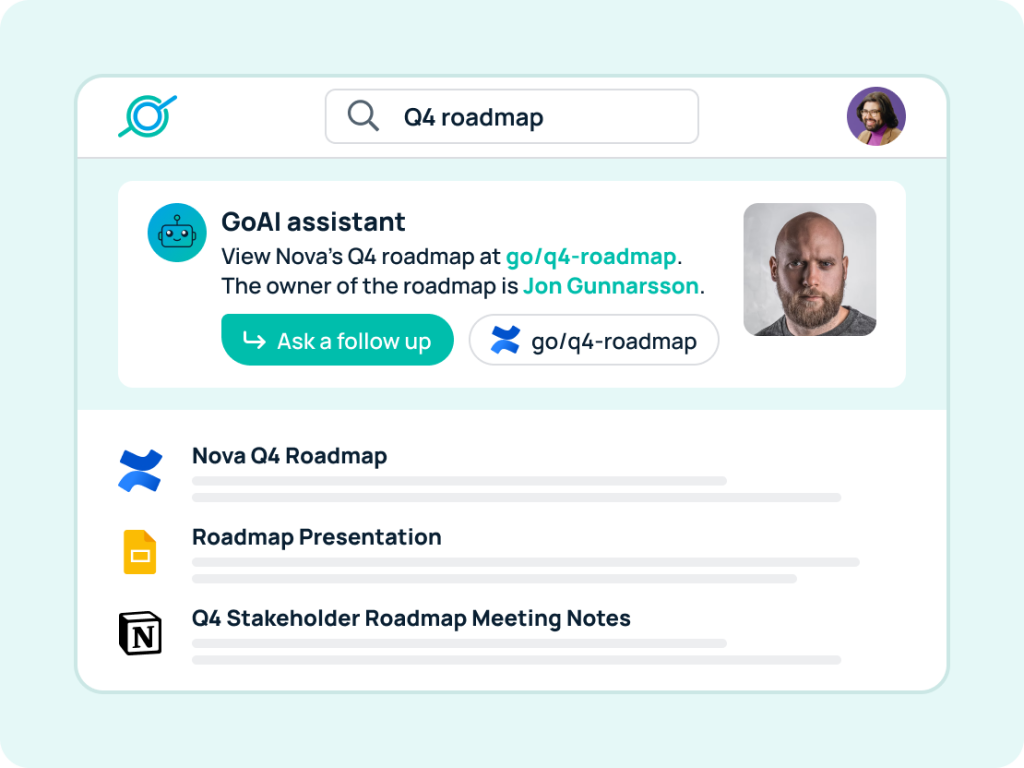Knowledge management (KM) involves capturing, organizing, sharing, and using information in a way that helps companies make better decisions. It is a vital part of how modern businesses operate.
This article will explore how knowledge management enhances the decision-making process. We’ll dive into the knowledge management benefits and discuss how AI-driven tools can enhance how businesses manage information and make decisions.
The benefits of knowledge management for organizations
Improving efficiency and productivity
When employees have quick access to the information they need, they spend less time searching for documents or asking colleagues for help. This streamlines processes and workflows, allowing teams to focus on their core tasks.
The McKinsey Global Institute found that employees spend nearly 20% of their workweek searching for internal information or tracking down colleagues for help.
Encouraging innovation and creativity
When collective knowledge is easily accessible, employees are more likely to share their know-how across departments. This sharing culture encourages continuous learning and the development of new ideas.
By implementing a solid knowledge management strategy, businesses create an environment where innovation thrives. Employees can build on each other’s knowledge and experiences, leading to the development of creative solutions that can drive the company forward.
Better risk management and compliance
Effective knowledge management also plays a critical role in managing risks and ensuring compliance. By maintaining accurate and up-to-date information, companies can make more informed decisions. This helps them avoid potential risks and navigate complex regulatory environments.
Strengthening organizational culture
By encouraging subject-matter experts to share knowledge, businesses create a more engaged and motivated workforce. Employees who feel valued and involved are more likely to stay with the company, reducing turnover and fostering long-term success.
How knowledge management enhances the decision-making process
Access to accurate and relevant information
In the decision-making process, having access to accurate and relevant information is essential. Gartner reports that poor data quality costs organizations an average of $12.9 million annually.
A well-organized knowledge management process creates a centralized repository where employees can easily find the most current and reliable resources.
Improving decision-making speed and quality
Knowledge management benefits extend to both the speed and quality of decision-making. When employees can quickly find the data they need, they can make decisions faster. This is particularly important in industries where quick decision-making is essential to staying competitive.
Supporting data-driven decisions
Another key advantage of knowledge management is its support for data-driven decision-making. In today’s data-rich environment, relying on intuition alone is not enough. Businesses need to make decisions based on solid evidence, and knowledge management systems provide the necessary tools to do so.
Enhancing collaboration in decision-making processes
Collaboration is a crucial element of effective decision-making, and knowledge management tools are vital in facilitating this. When teams can easily access and share information, they can collaborate more effectively, leading to better decisions.
The role of AI in knowledge management
Automating knowledge capture and organization
Artificial intelligence (AI) is transforming how businesses manage knowledge. One primary way AI supports knowledge management is by automating the capture and organization of information. AI-driven systems can automatically tag, categorize, and index knowledge, making it easier to store and retrieve.
This automation not only saves time but also ensures that knowledge is organized and easily accessible. By reducing the manual effort required to manage information, AI allows employees to focus on more strategic tasks.
Enhancing search capabilities
AI also significantly improves search capabilities within knowledge management systems. With natural language processing (NLP), AI can understand and respond to queries more intuitively. This means that employees can find the information they need quickly and easily, even if they’re not sure exactly what they’re looking for.
The ability to search for information using everyday language rather than complex search terms makes knowledge management systems more user-friendly and effective.
Providing predictive analytics and insights
AI’s ability to analyze large datasets and predict trends is another major benefit for knowledge management. By providing actionable insights and forecasts, AI helps businesses make proactive decisions based on accurate data.
These AI-driven insights support more informed decision-making by identifying patterns and trends that might not be immediately obvious. This predictive capability is particularly valuable in industries where staying ahead of the curve is essential for success.
Personalizing knowledge delivery
AI can also personalize the knowledge management experience by recommending relevant content to employees based on their behavior and preferences. This ensures that decision-makers have access to the most pertinent information, helping them make better decisions more quickly.
By tailoring knowledge delivery to individual needs, AI enhances the overall effectiveness of knowledge management systems and ensures that employees have the information they need when they need it.
Top knowledge management tools for better decision-making
GoLinks
GoLinks is a powerful tool for knowledge management. With GoLinks, employees can take long, ugly URLs and turn them into memorable short links. These short links make information way easier to find and access, which supports better decision-making processes.
→ Read about knowledge management with GoLinks

GoSearch
GoSearch is an enterprise search tool that centralizes all of your workplace knowledge into one single search bar. It leverages AI to answer any workplace question employees have, and its advanced search capabilities ensure that employees can find accurate and relevant information quickly.
→ Read about knowledge management with GoSearch

Getting started with GoLinks + GoSearch
Implementing knowledge management strategies with GoLinks and GoSearch will increase efficiency, foster innovation, manage risks, and build a strong organizational culture.
Schedule a demo to see these tools in action.
Access and share resources instantly with GoLinks
Schedule a demo
FAQ Section
1. What is knowledge management?
Knowledge management (KM) is the process of capturing, organizing, sharing, and using information within an organization to support decision-making and improve efficiency.
2. How does knowledge management enhance the decision-making process?
KM improves decision-making by providing access to accurate and relevant information, speeding up the decision-making process, and promoting collaboration across departments.
3. What are the benefits of knowledge management?
Knowledge management benefits include improved efficiency, enhanced innovation, better risk management, and a stronger organizational culture.
4. How does AI support knowledge management in business?
AI supports KM by automating knowledge capture and organization, improving search capabilities, providing predictive analytics, and delivering personalized knowledge recommendations.
5. What are some popular knowledge management tools?
Popular KM tools include GoLinks, GoSearch, Confluence, SharePoint, and Slack. These tools help organizations manage information and improve decision-making.
6. How can I implement a knowledge management strategy in my organization?
To implement a KM strategy, start by identifying the knowledge needs of your organization, selecting the right tools, and encouraging a culture of knowledge sharing and collaboration.
7. How does information management support decision-making?
Information management supports decision-making by ensuring that the right data is available to the right people at the right time. It involves organizing, storing, and retrieving information efficiently, so decision-makers can access accurate and timely information to make informed choices.














